Concept Art & Game Design Plans
Howdy, Boz here,
Since releasing the original alpha version of Twilight Tower, I’ve kept busy building and testing new prototype features, writing narrative, creating UI mockups, and planning the game design. Meanwhile, c0hil has been helping us visualize this chaotic tower and the musician has been laying out moods.

This is that point in development where we don't have much flashy gameplay to show, but I can share with you some features we're planning/testing and the reasoning behind them. These will all be subject to change, and parts of it will definitely be removed for simplicity's sake, but we're in the exciting phase of throwing things at the wall and seeing what sticks.
Not Just Another Battle Card Game
One of our goals is to make a card game that can work without battling opponents, but instead you’re in a struggle with yourself, survival, and morality. It’s more about decision-making in a more direct sense.
So how do you do that?
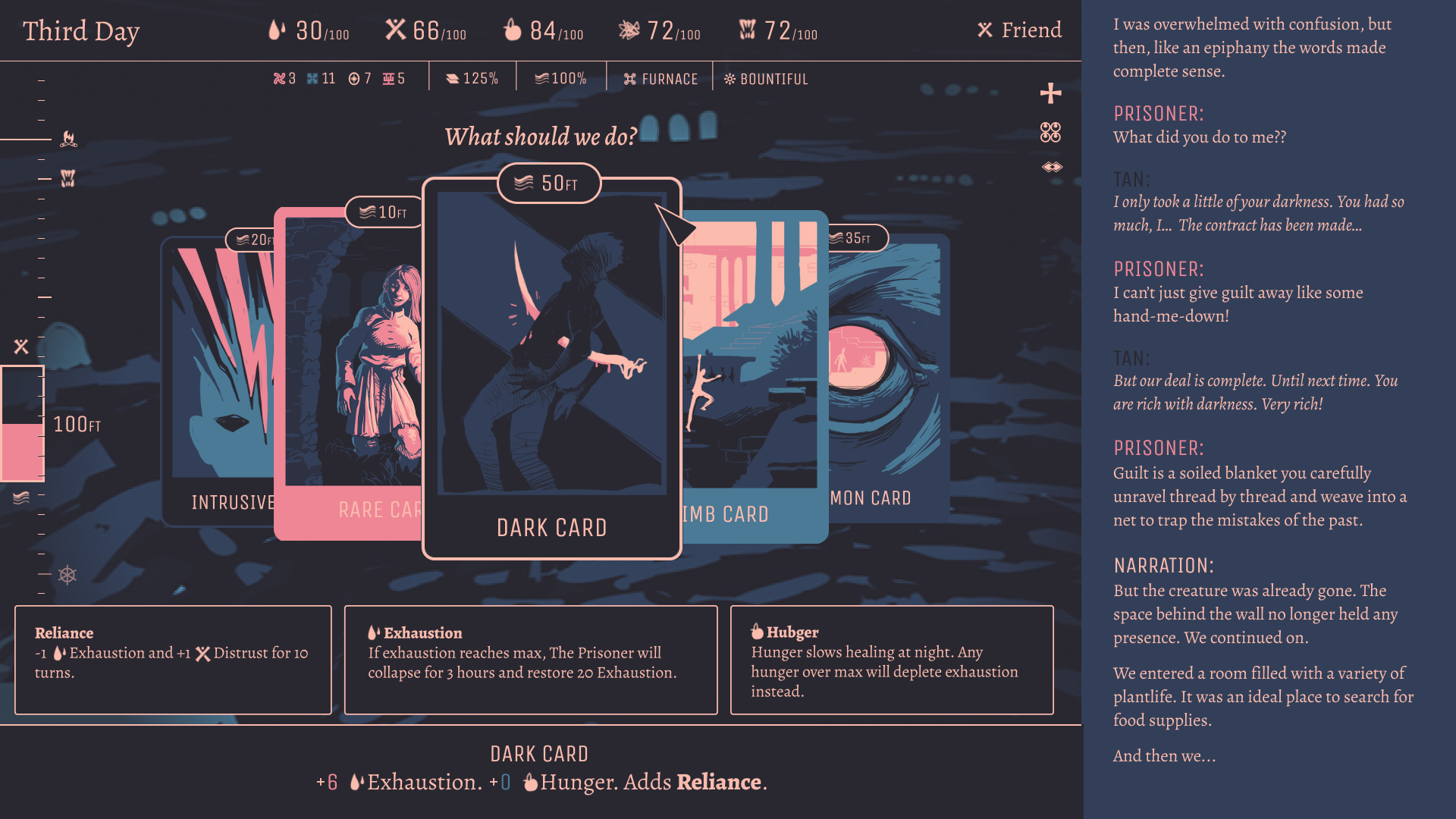
Refresher: The Basics
You climb Twilight Tower to escape a sand that slowly creeps after you. It moves through the cracks in the floor, but somehow never seems to fall into the central abyss. Along the way, you meet companions who may join you and converse at camp. In your attempt to survive, you may be forced to make decisions of questionable morality. Your companion may abandon you for these choices, or throw themselves in the path of danger to save you.
Branching Paths
Imagine you can play a card that lets you navigate further from the center of the tower, where it becomes more chaotic. It's harder to climb high here and the sand is constantly on your heels, but there are rarer finds.
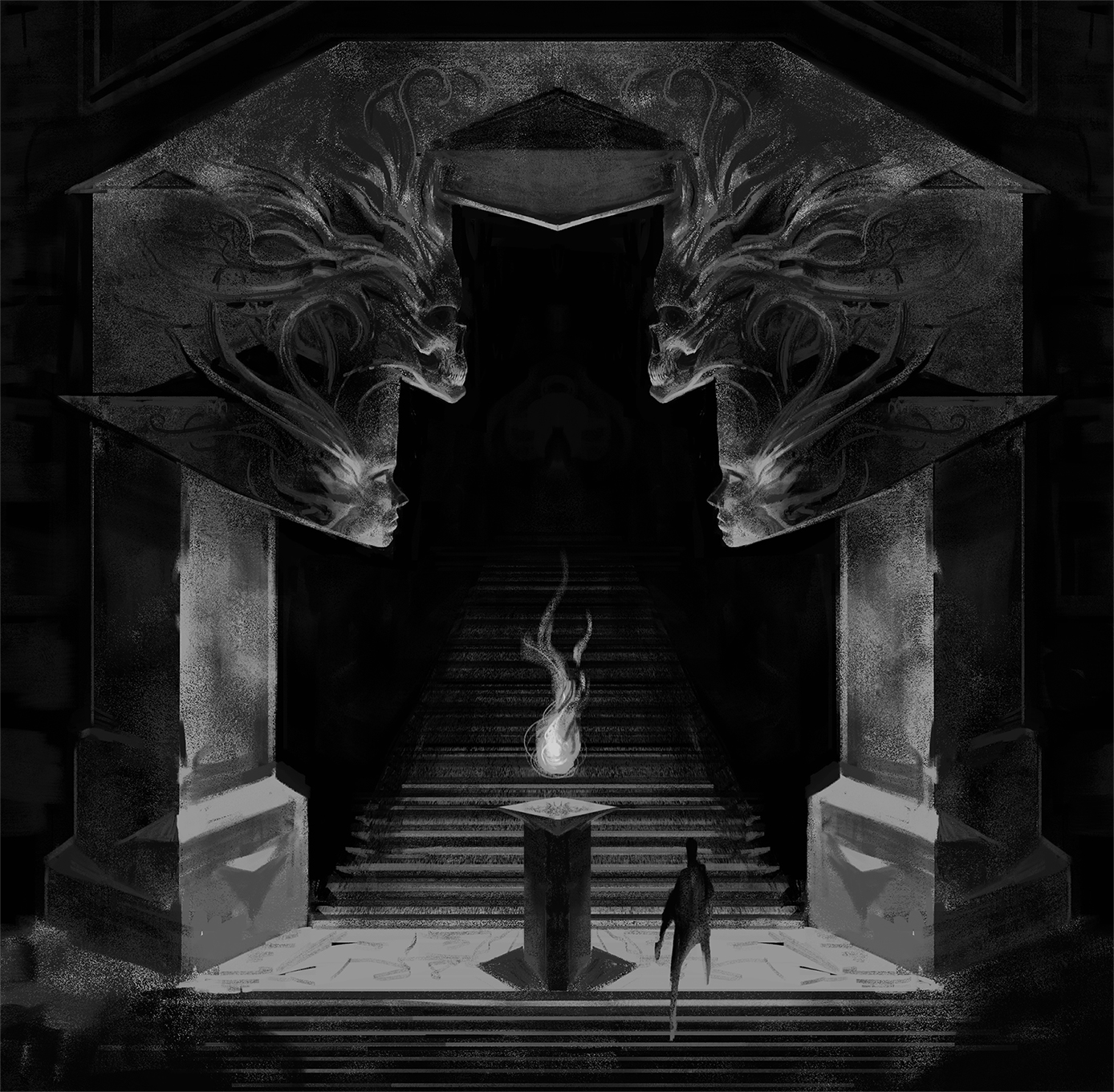
Discover Permanent Unlocks
Imagine exploring pathways and finding a character you've never met before. A dialogue option appears that you can only select if you have some item, or one of your stats is super high, or maybe you have a specific card. You make a trade and are given a rare card you've never seen before. This card now permanently shows up in the options when you have a choice of new cards.
Mysterious Encounters
Imagine, while far from the atrium, you encounter a portal that takes you closer to the less chaotic atrium of the tower if you agree to drop your weapon. Or you encounter a bizarre large eyeball behind a wall that feeds on Guilt and gifts cards in exchange. Encounters can help you customize your deck, unlock new cards, find items, add new cards, progress the story, and more.
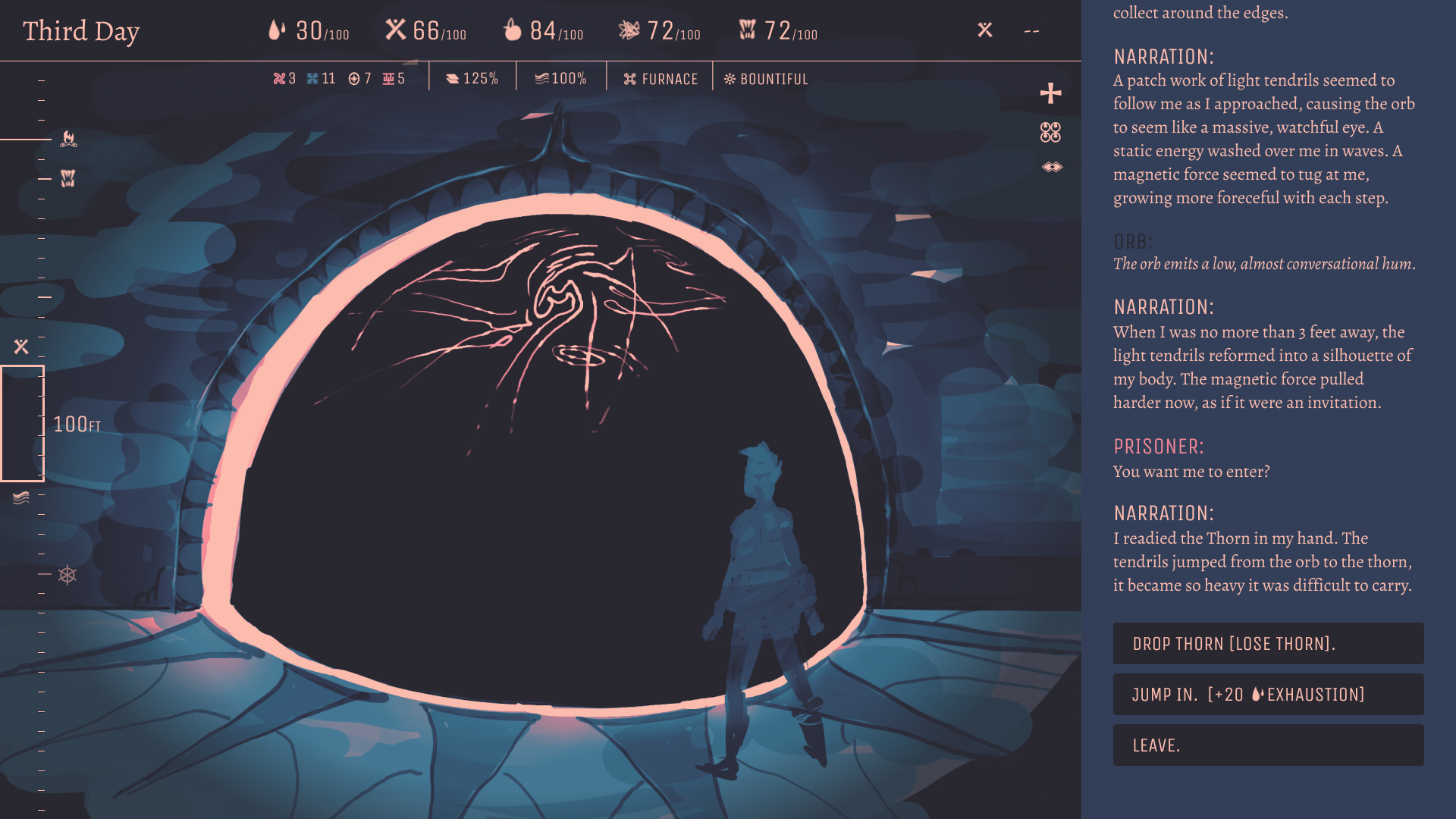
Progressing Narrative
Imagine encountering characters you've met in previous runs but revealing new dialogue options.
Improvisation - Incidents
Imagine before your turn starts, you encounter a cute furry creature. You know that if you startle it, it will make a high pitched squeal that will make your ears bleed, which will increase Desperation every turn for a few turns. When your card selections appear, each one displays a chance to startle the creature. The card you really, really wanted to play has a 60% chance (increased by your Desperation). Now you have to decide if playing that card outweighs the chance of getting wounded, when you see another viable card with a 0% chance. These are the types of events we're working on to throw gameplay off of a set ideal course of action ever turn and require more improvisation and decision-making.
Improvisation - Areas
Imagine you enter an area with a general theme, like a stone dungeon area, a mysterious cave, a sandy passageway, a creature's nest, a furnace, a chaotic building, a shrine, etc. This area sets a theme for the type incidents you might encounter. Additionally, this area has a passive modifier to your cards - like the furnace area is super hot so all exhaustion events cost more. Or a lush plant-life area where hunger decreases faster.
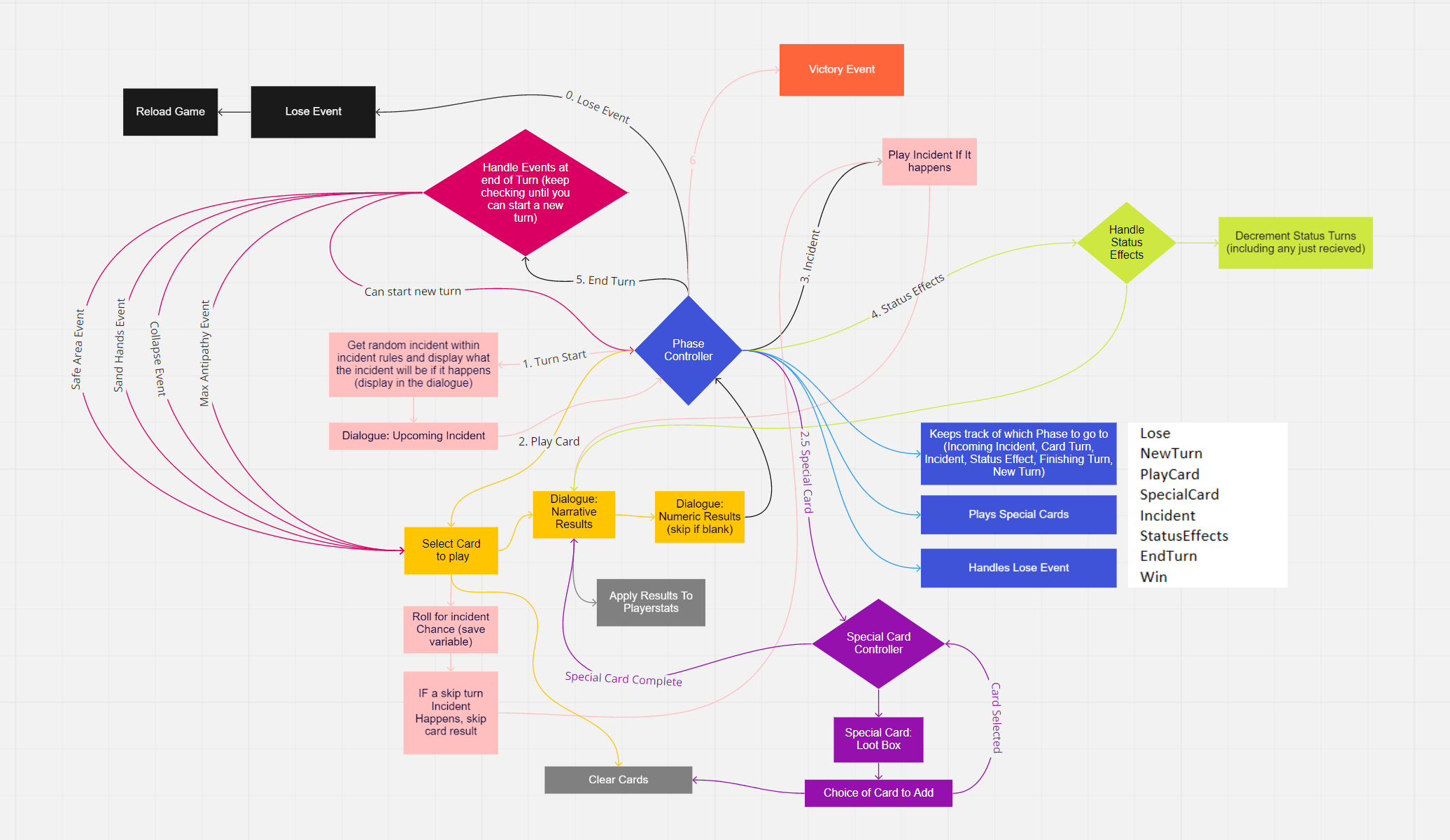
Stats
Antipathy
I wanted stats to be more internalized (subjective) rather than external (objective) - like Distrust described the state of your companion more than something about your own character. I looked for a name to describe how you treat others and how they perceive you. Charisma immediately came to mind, but Twilight Tower only uses negative traits. What is the opposite of Charisma? There is no satisfying word that would sound like a stat. We landed on Antipathy - the opposite of sympathy. Defined as "a dislike for something or someone. While antipathy may be induced by experience, it sometimes exists without a rational cause-and-effect explanation being present to the individuals involved." The more Antipathy your character has, the less agreeable they are. Though, some you encounter might appreciate that.
Desperation
Danger became Risk became Disregard became Desperation. The idea is that your character becomes more desperate and starts to make big moves (crits), but also makes mistakes - gets into incidents more, has accidents, gets wounded a lot.
Guilt
Guilt became Shame, then returned to Guilt. Guilt can be defined as "the fact of having committed a specified or implied offense or crime." But the clinical term is "feeling responsible or regretful for a perceived offense, real or imaginary. Can be part of the grief reaction. Guilt can be normal, and is only an indicator of underlying disease when feelings become excessive, all-consuming, and interfere with daily living." Thinking of guilt as shame opens more avenues - feeling inadequate also causes guilt.
Exhaustion is still Exhaustion and Hunger is still Hunger.
Stat Pros and Cons
It's still being tested, but each stat now has a pro and a con at both the low and high ranges. For example, desperation can increase or lower your chances to take extra initiative, but also increase or lower your chances to make mistakes and be wounded.
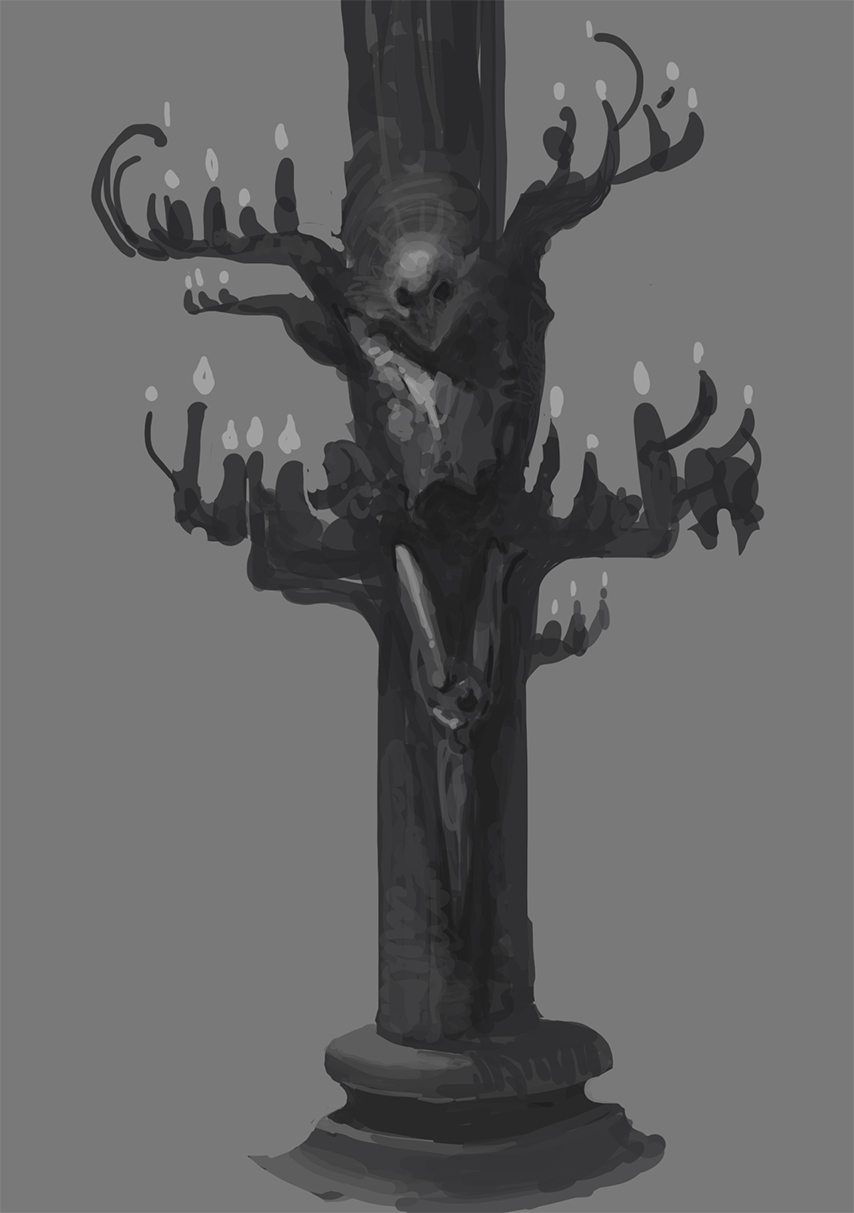
Safe Zone
One of the problems in the prototypes was positive feedback loops. You could potentially get a lucky combination of events and now you're so far ahead that your choices don't seem to matter anymore.
I prefer the idea that you can be PREPARED, but you still have to set up. You might have an awesome setup that you've spent the run carefully crafting, but you should still feel the fear of the knife's edge.
Imagine you're on that god run: Everything seems to be going your way (because you made your own luck), BUT then you get caught with your pants down. You've been compromised, your gear is out of reach and your usual strategies are off limits. How are you going to recover from that situation? Comebacks make for better storytelling than "I was doing well, then I did better, then I won no problem".
Enter the concept of Safe Zones. This is a twist on the camp idea in the previous prototype. When you reach a safe area, you can rest and the sand can't pass this zone for a period of time. It's not that the sand doesn't rise at all while you're there, it's that it can't pass it.
This means when you reach a zone area, any excess lead you had over the sand has been reset. What's more, is your buffs have been reset.
You're essentially starting a new day, shaking the stiffness out of your muscles, drinking whatever the Twilight Tower equivalent of morning coffee is, and resuming your journey anew. You'll then start to set up your strategies again.
That's not to say that progression has been reset - over the course of the run you've customized your deck, added stronger cards, and found equipment to help you on your journey, so you're still stronger than when you started.
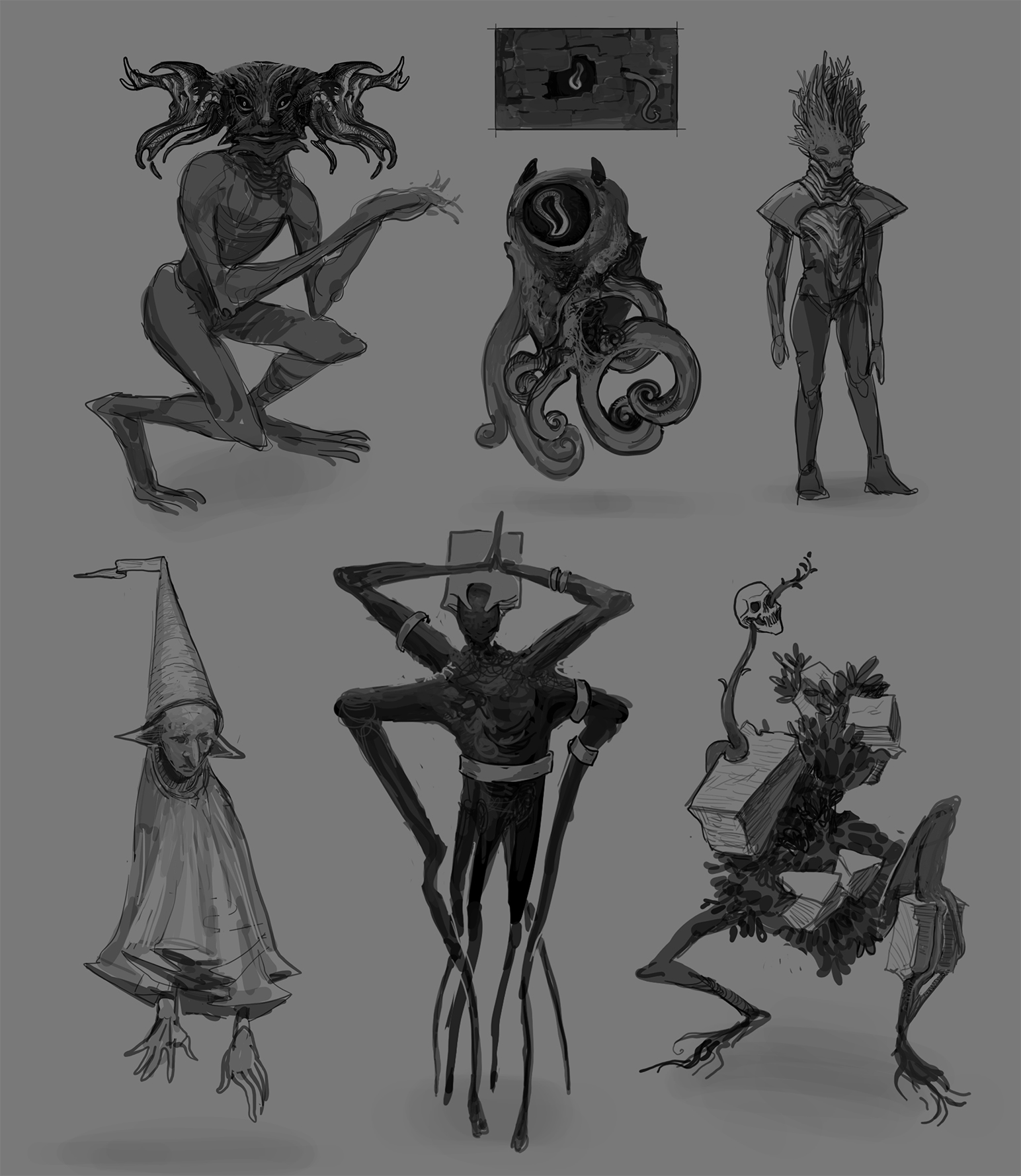
I'm probably forgetting some things, but they can wait for the next update.
Again, this is all subject to change as they are prototyped, some will even be culled, but I wanted to give everyone a glimpse into how things are going and the problems these features we're attempting to solve.
As always, if you have any feedback, please let us know!
– Boz
-----
Updates in Your Inbox
Signup for the newsletter at: https://www.getrevue.co/profile/aesth
Get Twilight Tower (post jam version)
Twilight Tower (post jam version)
A survival horror/roguelite/dark decision-making card game hybrid where morality conflicts with survival.
| Status | In development |
| Author | Boz of Aesth |
| Genre | Card Game, Role Playing, Strategy, Survival |
| Tags | Deck Building, Horror, Multiple Endings, Psychological Horror, Roguelite, Survival Horror |
| Languages | English |
More posts
- Towers and TribulationsMay 29, 2022
- What I'm Saying When I Say 'Game Design'May 25, 2022
- The Highs and Lows of Game DesignOct 22, 2021
- 2021/05/22 BugfixMay 22, 2021
- 2021/04/30 UpdatesApr 30, 2021
- 2021/04/24 UpdateApr 24, 2021
- 2021/04/23 UpdatesApr 23, 2021
- Twilight Tower Updates & Future PlansApr 04, 2021
- 2021/3/27/UpdatesMar 27, 2021

Leave a comment
Log in with itch.io to leave a comment.